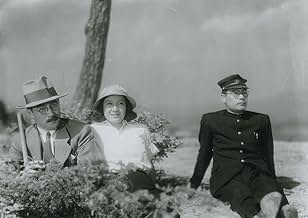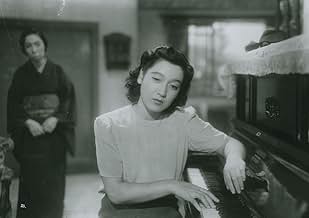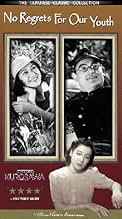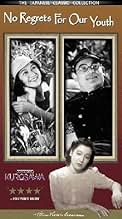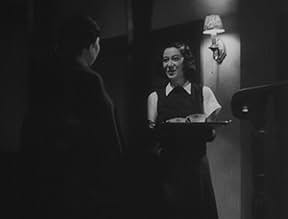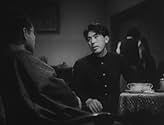Füge eine Handlung in deiner Sprache hinzuThe daughter of a politically disgraced university professor struggles to find a place for herself in love and life, in the uncertain world of Japan leading into WWII.The daughter of a politically disgraced university professor struggles to find a place for herself in love and life, in the uncertain world of Japan leading into WWII.The daughter of a politically disgraced university professor struggles to find a place for herself in love and life, in the uncertain world of Japan leading into WWII.
Empfohlene Bewertungen
The title of the movie comes from Noge's statement to Yukie halfway through the film - she does not know he has continued his involvement in the anti-war movement, although he has spent time in prison and China for protesting. He tells her he has no regrets for any of his actions. Yukie doesn't quite understand until he is arrested and eventually killed for spying. Yukie has the option of returning home to her parents, but instead she finds Noge's parents and moves in with them. There she suffers hardship, sickness, and the humiliation of being known as an anti-war collaborator. The central question of the movie is why did she do this? Was she trying to "hold on" to a lost lover? Did she feel guilt over not having been more active in the anti-war movement? Was this her penance for a mis-spent youth? Even more perplexing is the way she rebukes Isokawa at the end of the film by refusing to show him Noge's grave - Isokawa had supported Japanese involvement in the war.
Perhaps the film is about the mind-state of Japan after losing the war - those who opposed the war, or who struggled through hardship to live normal lives, should value their actions in spite of the consequences. Those who supported the war deserve scorn and share in the responsibility of bloodshed.
I was very impressed by how the film made the characters convincing in both the first act where they are college students, and then again nearly 10 years later. The characters have changed not only in appearance but in personality and mannerisms. It made the passing years very convincing.
The film is interesting from both an historical viewpoint and as a pure drama. This was made just a year or so after the Japanese surrender in World War II, and we get a good feel for how the militaristic government in Japan was able to gain the unquestioning support of most of the population. Some things never change, do they?
Highly recommended, although if you are starting out on Kurosawa, you may want to try something from the 1955 to 66 period.
Kurosawa's oeuvre is generally chided for being too male-focused, but in Yukie, his only female protagonist, he gives us one of his finest heroes. Her transformation over the course of the movie is brilliantly played by Setsuko Hara. Her mannerisms and expressions allow her character to age credibly, more so than other movies I can think of where the audience watches a character age over many years. Yukie is idealistic, but also practical and steadfast.
As a film, NO REGRETS is executed with flair: Kurosawa has yet to develop his own signature style fully at this point in his career. I found a lot of debt to Soviet and European art cinema on display here, especially in the montages. He is not yet the master filmmaker he would become, but this is an astonishing early effort, heartfelt and assured. But it would be a shame to only see this movie as a stepping stone towards better things, for it is a fine piece of work in its own right.
Wusstest du schon
- WissenswertesFilming in 1946, just after the war, many of the cast and crew were living very poor lives, going hungry quite often. One of the actors recalled a personal story of his stomach growling during filming, causing the scene to have to be shot again.
- Zitate
Title Card: After the Manchurian Incident the militarists attempted to unify domestic opinions in order to realize their ambition to invade Asia. They denounced as "Red" any ideology that might hinder their policy. Professors and students fought the suppression. The Kyoto University Disturbance was one of their struggles for freedom.
- VerbindungenFeatured in The Pacific Century: Reinventing Japan (1992)
Top-Auswahl
- How long is No Regrets for Our Youth?Powered by Alexa
Details
- Laufzeit
- 1 Std. 50 Min.(110 min)
- Farbe
- Sound-Mix
- Seitenverhältnis
- 1.37 : 1

